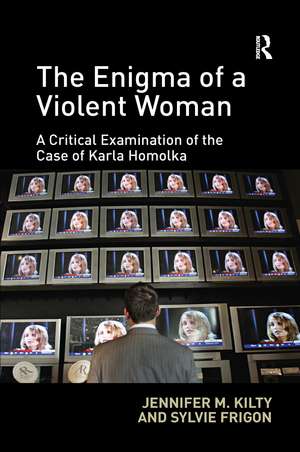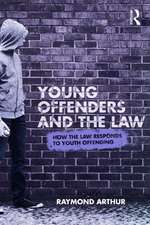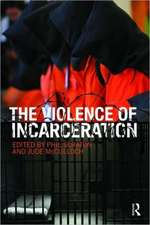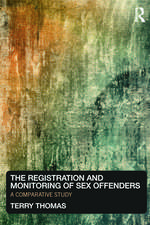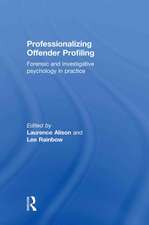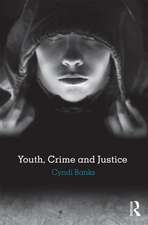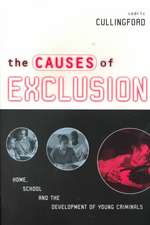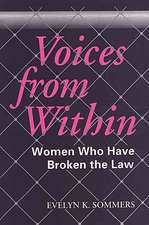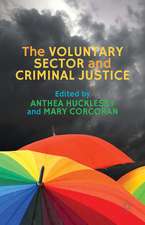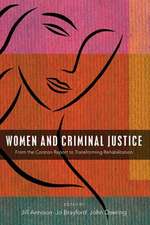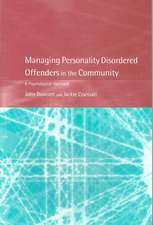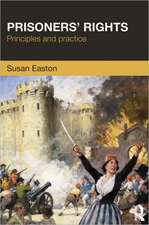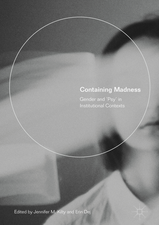The Enigma of a Violent Woman: A Critical Examination of the Case of Karla Homolka
Autor Jennifer Kilty, Sylvie Frigonen Limba Engleză Paperback – 30 iun 2020
In contrast to much of the contemporary discussion on this case, this book offers a comprehensive and detailed examination of the legal, public and media understandings and explanations of Homolka’s criminality. Drawing from multiple fields of study and varied bodies of critical literature, the book uses Homolka as an object lesson to interrogate some of the narratives and conceptualizations of ‘violent women’, the problematic normative constructions of womanhood and ‘acceptable femininity’, leniency in sentencing, taboo and disgust, and questions of remorse.
The authors address broad questions about how women convicted of violence are typically constructed across four sites: the courts; the academy; the mainstream media; and public discourse. This unique text is extremely important for feminist criminology and socio-legal studies, offering the first comprehensive academic effort to engage in dialogue about this important and fascinating case.
| Toate formatele și edițiile | Preț | Express |
|---|---|---|
| Paperback (1) | 255.57 lei 6-8 săpt. | |
| Taylor & Francis – 30 iun 2020 | 255.57 lei 6-8 săpt. | |
| Hardback (1) | 873.93 lei 6-8 săpt. | |
| Taylor & Francis – 25 apr 2016 | 873.93 lei 6-8 săpt. |
Preț: 255.57 lei
Preț vechi: 309.12 lei
-17% Nou
Puncte Express: 383
Preț estimativ în valută:
48.90€ • 52.29$ • 40.77£
48.90€ • 52.29$ • 40.77£
Carte tipărită la comandă
Livrare economică 18 aprilie-02 mai
Preluare comenzi: 021 569.72.76
Specificații
ISBN-13: 9780367596750
ISBN-10: 036759675X
Pagini: 160
Dimensiuni: 156 x 234 mm
Greutate: 0.24 kg
Ediția:1
Editura: Taylor & Francis
Colecția Routledge
Locul publicării:Oxford, United Kingdom
ISBN-10: 036759675X
Pagini: 160
Dimensiuni: 156 x 234 mm
Greutate: 0.24 kg
Ediția:1
Editura: Taylor & Francis
Colecția Routledge
Locul publicării:Oxford, United Kingdom
Cuprins
Preface; Introduction; Dissecting the gaze: the contradictory constructions of Karla Homolka as in danger and dangerous; Ideal victims and inconsistent offenders: notes on the effects of whiteness, gender, space and class on the cultural fixation on Karla Homolka; Breaking boundaries: notes on the effects of taboo and disgust on the cultural (re)presentations of Karla Homolka; Apologies and iced cappuccinos: examining media and juridical interpretations of Karla Homolka’s remorse performative; Conclusion; Appendices; Methodology; References; Index.
Notă biografică
Jennifer M. Kilty is Associate Professor in the Department of Criminology at the University of Ottawa. Her research primarily focuses on gender and different aspects of criminalization, including the social construction of dangerous girls and women, the medicalization/psychiatrization of criminalized women, self-harming behaviours, drug use, and more recently the criminalization of HIV nondisclosure. She recently edited two books, Within the Confines: Women and the Law in Canada and Demarginalizing Voices: Commitment, Emotion and Action in Qualitative Research, both published in 2014.
Sylvie Frigon is Professor in the Department of Criminology at the University of Ottawa, where she has been teaching since 1993. She is currently Joint Chair in Women’s Studies at the University of Ottawa and Carleton University and Senior Research Associate at Peterhouse, University of Cambridge. Alongside academic publications, she has published two novels, Écorchées (2006) on the issue of women in prison, and Ariane et son secret (2010) on a little girl’s quest for her imprisoned mother. She has also worked with Claire Jenny, choreographer and director of the Parisian dance company Point Virgule, with whom she published a book on dance in prison (2009). She is currently working on her third novel funded by the Ontario Arts Council and works in partnership with Le Grands Ballets Canadiens of Montreal’s Centre for Dance Therapy.
Sylvie Frigon is Professor in the Department of Criminology at the University of Ottawa, where she has been teaching since 1993. She is currently Joint Chair in Women’s Studies at the University of Ottawa and Carleton University and Senior Research Associate at Peterhouse, University of Cambridge. Alongside academic publications, she has published two novels, Écorchées (2006) on the issue of women in prison, and Ariane et son secret (2010) on a little girl’s quest for her imprisoned mother. She has also worked with Claire Jenny, choreographer and director of the Parisian dance company Point Virgule, with whom she published a book on dance in prison (2009). She is currently working on her third novel funded by the Ontario Arts Council and works in partnership with Le Grands Ballets Canadiens of Montreal’s Centre for Dance Therapy.
Recenzii
‘The spectre of Karla Homolka has invaded our understandings of criminalized women. By turning the gaze away from Homolka to interrogate our cultural fixation with her, Kilty and Frigon adeptly reveal the factors that coalesced to produce this enigmatic figure, enjoining us to rethink her as the paradigmatic Criminalized Woman.’
Elizabeth Comack, University of Manitoba, Canada
‘Exploring narratives of violence, remorse, and ideal victims/offenders, Kilty and Frigon deconstruct notions of femininity, whiteness, class and taboo in relation to the cultural preoccupation with Karla Homolka. This courageous feminist examination shifts the gaze to deliver a nuanced understanding of Homolka as enigmatic subject who both disgusts and fascinates.’
Sheri Fabian, Simon Fraser University, Canada
‘This book offers a commanding contribution to feminist, criminological and media studies and brings a much needed alternative and more holistic reading to the exceptional case of Karla Homolka. By offering an innovative and impressively thorough account of media, judicial and legal depictions of Canada’s most notorious criminalized woman, Kilty and Frigon offer an eye-opening and thought-provoking analysis of the more significant intersections of race, class, hetero-patriarchal culture, broken taboos, and issues of remorse which have conjoined to shed, on Karla Homolka, a quasi-permanent evil aura. The book’s rigorous academic undertaking will go far in changing traditional criminological, judicial and media interpretations of women who commit acts of violence. This important book is a valuable and most welcome addition to criminological and gender studies.’
Joane Martel, Laval University, Canada
Elizabeth Comack, University of Manitoba, Canada
‘Exploring narratives of violence, remorse, and ideal victims/offenders, Kilty and Frigon deconstruct notions of femininity, whiteness, class and taboo in relation to the cultural preoccupation with Karla Homolka. This courageous feminist examination shifts the gaze to deliver a nuanced understanding of Homolka as enigmatic subject who both disgusts and fascinates.’
Sheri Fabian, Simon Fraser University, Canada
‘This book offers a commanding contribution to feminist, criminological and media studies and brings a much needed alternative and more holistic reading to the exceptional case of Karla Homolka. By offering an innovative and impressively thorough account of media, judicial and legal depictions of Canada’s most notorious criminalized woman, Kilty and Frigon offer an eye-opening and thought-provoking analysis of the more significant intersections of race, class, hetero-patriarchal culture, broken taboos, and issues of remorse which have conjoined to shed, on Karla Homolka, a quasi-permanent evil aura. The book’s rigorous academic undertaking will go far in changing traditional criminological, judicial and media interpretations of women who commit acts of violence. This important book is a valuable and most welcome addition to criminological and gender studies.’
Joane Martel, Laval University, Canada
Descriere
In contrast to much of the contemporary discussion of the case of Karla Homolka, this book offers a comprehensive and detailed academic examination of the legal, public and media understandings and explanations of Homolka’s criminality. The authors use Homolka as an object lesson to interrogate some of the narratives and conceptualizations of ’viol
